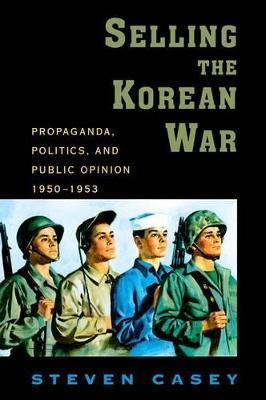Selling the Korean War: Propaganda, Politics, and Public Opinion in the United States, 1950-1953

Selling the Korean War: Propaganda, Politics, and Public Opinion in the United States, 1950-1953
How presidents spark and sustain support for wars remains an enduring and significant problem. Korea was the first limited war the U.S. experienced in the contemporary period - the first recent war fought for something less than total victory. In Selling the Korean War, Steven Casey explores how President Truman and then Eisenhower tried to sell it to the American public. Based on a massive array of primary sources, Casey subtly explores the government's selling activities from all angles. He looks at the halting and sometimes chaotic efforts of Harry Truman and Dean Acheson, Dwight Eisenhower and John Foster Dulles. He examines the relationships that they and their subordinates developed with a host of other institutions, from Congress and the press to Hollywood and labor. And he assesses the complex and fraught interactions between the military and war correspondents in the battlefield theater itself. From high politics to bitter media spats, Casey guides the reader through the domestic debates of this messy, costly war. He highlights the actions and calculations of colorful figures, including Senators Robert Taft and JHoseph McCarthy, and General Douglas MacArthur. He details how the culture and work routines of Congress and the media influenced political tactics and daily news stories. And he explores how different phases of the war threw up different problems - from the initial disasters in the summer of 1950 to the giddy prospects of victory in October 1950, from the massive defeats in the wake of China's massive intervention to the lengthy period of stalemate fighting in 1952 and 1953.
PRP: 480.92 Lei
Acesta este Prețul Recomandat de Producător. Prețul de vânzare al produsului este afișat mai jos.
432.83Lei
432.83Lei
480.92 LeiIndisponibil
Descrierea produsului
How presidents spark and sustain support for wars remains an enduring and significant problem. Korea was the first limited war the U.S. experienced in the contemporary period - the first recent war fought for something less than total victory. In Selling the Korean War, Steven Casey explores how President Truman and then Eisenhower tried to sell it to the American public. Based on a massive array of primary sources, Casey subtly explores the government's selling activities from all angles. He looks at the halting and sometimes chaotic efforts of Harry Truman and Dean Acheson, Dwight Eisenhower and John Foster Dulles. He examines the relationships that they and their subordinates developed with a host of other institutions, from Congress and the press to Hollywood and labor. And he assesses the complex and fraught interactions between the military and war correspondents in the battlefield theater itself. From high politics to bitter media spats, Casey guides the reader through the domestic debates of this messy, costly war. He highlights the actions and calculations of colorful figures, including Senators Robert Taft and JHoseph McCarthy, and General Douglas MacArthur. He details how the culture and work routines of Congress and the media influenced political tactics and daily news stories. And he explores how different phases of the war threw up different problems - from the initial disasters in the summer of 1950 to the giddy prospects of victory in October 1950, from the massive defeats in the wake of China's massive intervention to the lengthy period of stalemate fighting in 1952 and 1953.
Detaliile produsului










